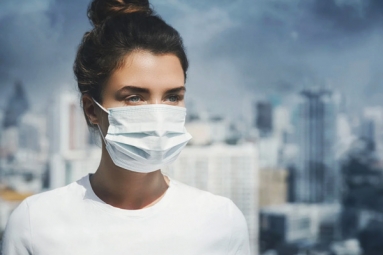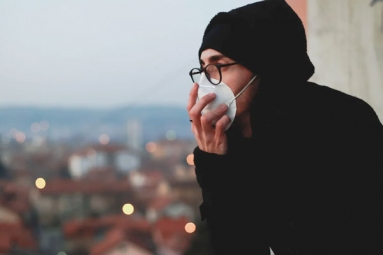
(Image source from: Indiatoday.in)
The Delhi NCR region is already facing a very bad air pollution problem, and now there's another danger. Ash from Ethiopia's Hayli Gubbi volcano has begun to enter Indian airspace. NDTV reports that ash clouds from this unusual volcanic eruption have reached Delhi, making people worry about health in an area where breathing clean air is already hard. Volcanic ash is different from normal dust. It's made of tiny bits of rock and glass, often covered in acidic chemicals and mixed with gases like sulfur dioxide. Experts say that breathing in fine ash or volcanic smog can irritate the lungs, make asthma or bronchitis worse, and cause other breathing difficulties. In Delhi, where the Air Quality Index (AQI) is often "very poor" or "severe," even a small amount of extra particles can cause a lot of damage. As the ash cloud moves through, knowing its health effects and what to do to protect yourself can be very important. Here's a closer look at the dangers and the protective actions you should take.
It has always been important to study how vog affects health. Here are some health problems you should know about.
Breathing Issues: Who Is Most Affected: Volcanic ash has tiny bits that can go deep into your lungs. The US Geological Survey Impacts & Mitigation says that breathing in fine ash can cause:
Your nose, throat, and upper breathing tubes to get annoyed
A dry cough, sore throat, or chest pain
Symptoms like bronchitis or wheezing if you have asthma or long-term bronchitis
Even healthy people might feel short of breath or uncomfortable after breathing in a lot of ash. But for those who already have lung problems, the effects can be worse. Volcanic ash is not just smoke; it's a mix of very tiny pieces of rock, minerals, and harmful gases. These pieces are often smaller than 10 microns, which means they can get past your nose's natural filters and go deep into your lungs. Volcanic ash can act like PM2.5 air pollution. It can cause your airways to tighten, reduce oxygen in your body, and make existing health problems worse for people who are easily affected to long-lasting breathing problems.
Dangerous gases like sulfur dioxide and "vog" (a misty mix of sulfur dioxide and water that hurts breathing) can come from volcanoes, along with ash.
Breathing these gases for a short time can lead to:
- Sore eyes
- Feeling dizzy
- Headaches
- Trouble breathing
- Coughing
Being around these gases often or for a long time can cause bronchitis or lasting breathing problems.
Other health problems: Eyes, Skin, and Stress
Volcanic ash can also harm other body parts:
Eye problems: Tiny ash bits can make eyes red, watery, or feel scratchy.
Skin problems: Ash on the skin can make it dry and itchy.
Mental stress: Big eruptions can make people in affected areas feel worried, scared, and stressed, especially if ash messes up their daily lives or creates uncertainty.
Delhi's current situation: How dangerous is it?
NDTV reported that wind carried ash from an Ethiopian volcano to Delhi and nearby areas. But weather experts believe this ash won't affect the air quality much at ground level in Delhi, because most of it is very high up, between 25,000 and 45,000 feet.
It's not clear if there will be a big change, so a huge increase is doubtful. Delhi's air quality is still very bad, sometimes at a dangerous level, meaning people are already breathing in a lot of pollution. So, while the ash from the volcano might not make the surface air quality much worse, it could still be a health risk for sensitive people because the city's air is already dangerous.
How People In Delhi And Other Affected Areas Should Protect Themselves
Dr. Vikas Mittal, a lung specialist at the CK Birla Hospital in Delhi, states that "Volcanic ash has harmful gases like sulfur dioxide and nitrogen dioxide. It might have tiny particles that can make smog worse and cause a big health problem. People who already have lung, heart, kidney, or liver conditions should be extra careful and tell their doctors right away if their symptoms get worse. It's best to stay indoors and use N95 masks when needed."







